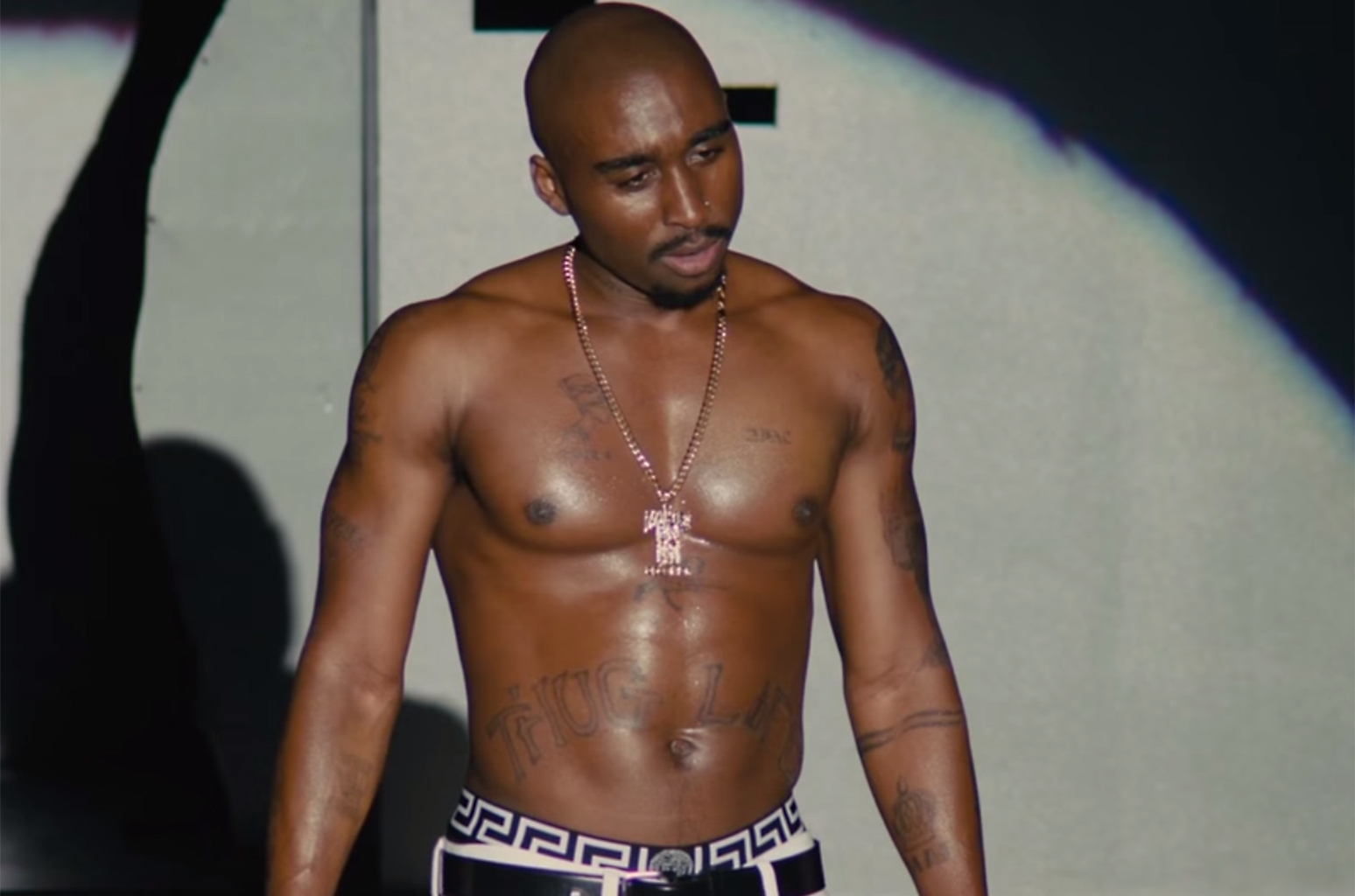
All Eyez on Me follows the life of the black James Dean, legendary rapper/actor Tupac “2Pac” Shakur (Demetrius Shipp Jr.). The film follows his life from his birth in New York City to Black Panther activist Afeni Shakur (Danai Gurira) through his murder in Las Vegas in 1996.
All Eyez on Me does a lot of things well and had a lot of accuracy that it is not receiving credit for, but ultimately left what could have been a great film on the table and instead became just ok fan service. 2Pac is my favorite rapper of all-time and I left the film thinking that it was cool seeing the life that I know so well portrayed on the big screen, but some of the complexity and emotional turmoil was lost in service of that. The film was two and a half hours long but it still felt like the pacing was rushed in spots, particularly his early life.
While the film did show his early childhood in Harlem, his belonging to a family of political outsiders, and the subsequent moves to Baltimore and Marin City, CA, it was more surface level and not fleshed out. This was a mistake that has reverberations throughout the rest of the film because this helps set the stage for Tupac’s mindset and experiences throughout the rest of his life. His time in Baltimore was joyous period for him, attending the School for the Arts and learning acting, ballet, and creating lasting, diverse friendships. Being abruptly pulled from Baltimore and moved to Marin City in the midst of his mother’s drug addiction affected him deeply; soon ending with Tupac homeless and around a rougher, more hood element that would form the basis for his later, more “Thug Life” persona. Really establishing this would’ve informed audiences that aren’t as familiar with his life would created a strong emotional core for the film moving toward Tupac’s tragic ending. The film also didn’t go deep enough into his fallout and subsequent with his New York City friends. It didn’t feel as if his closeness with the Stretch (Tupac’s right hand man at the time who wasn’t even in the film), Notorious B.I.G., “Nigel”, etc. was strongly portrayed, making it evident why the resulting beef was so passionate. It all happened so quickly with the closeness that resulted in Tupac feeling so betrayed by the subsequent robbery/shooting being a little glossed over. These two incidents being so instrumental in charting Tupac’s path make it different from the typical liberties with history that biopic’s take. For instance, Tupac and Jada Pinkett’s final conversation taking place after a concert was called out by Pinkett herself for its inaccuracy. But I agree with producer LT Hutton’s explanation that such a personal and emotional conversation works better onscreen as being face to face rather than over the phone. A minor environment change like that is par for the course in biopics but major life-changing moments like Tupac’s move from Baltimore and the depth of his relationships in New York pre-Quad Studios demand a full accounting and portrayal.
Despite the foundations for Tupac’s mindset and subsequent path not being explored to their full capacity, the film did accurately portray a lot of thing the average rap or 2Pac fan might not have known. For instance, the Notorious B.I.G. did try to visit Tupac in the hospital after the shooting and I liked that little known figures in his rise to stardom such as Leila Steinberg (Lauren Cohan) and Atron Gregory (Keith Robinson) did get a mention. I was also impressed by the emotion displayed in the scenes showing Tupac’s final conversations with Jada, his mother, and fiancee Kidada Jones (Annie Ilonzeh) respectively. Particularly the scene with Kidada, knowing what was coming soon after made the scenes that much more poignant and haunting. They really left an impression and made you think about speaking to a loved one without knowing you’d never see them again, particularly when you have a bad feeling about departing and almost declining to do so.
The performances from the main actors in the film ranged from very good to great. Shipp did extremely well as Tupac, really transforming into the man we all know and being 100% believable. Portraying someone as iconic and recognizable as Tupac is extraordinarily difficult and Shipp deserves credit for pulling it off in his first major film role. Danai Gurira was fantastic in her turn as Afeni Shakur. In a pretty well acted film as far as main players go, she really stood head and shoulders above her peers deftly portraying Ms. Shakur at all stages in her life, both the highs and the lows. Gurira has true star potential as an actress, I can’t say enough about her performance. Kat Graham also shined as Jada Pinkett, displaying great chemistry with Shipp and making the friendship between Tupac and Jada very real and believable. The love between the two characters represented a sizable portion of the film’s emotional core and Shipp and Graham made sure that part of the film worked. I was however disappointed by the actors cast in the roles of Tupac’s Death Row labelmates. In a bit of extraordinarily lazy filmmaking, All Eyez on Me utilized the real Snoop Dogg as a voice actor for his character, portrayed by Jarrett Ellis. If director Benny Boom was so dissatisfied by Ellis’ work as Snoop Dogg, he should’ve cast a better actor rather than use voiceover of the actual person that was being portrayed. It really is the most egregious thing I’ve seen in a movie in a while.
All in all, All Eyez on Me is worthy of a watch for those fascinated by Tupac Shakur and his life and those that are fans of his life. If you only have casual interest, you’d probably be best served waiting until it hits Blu Ray or streaming for home viewing.
Image: Summit Entertainment

